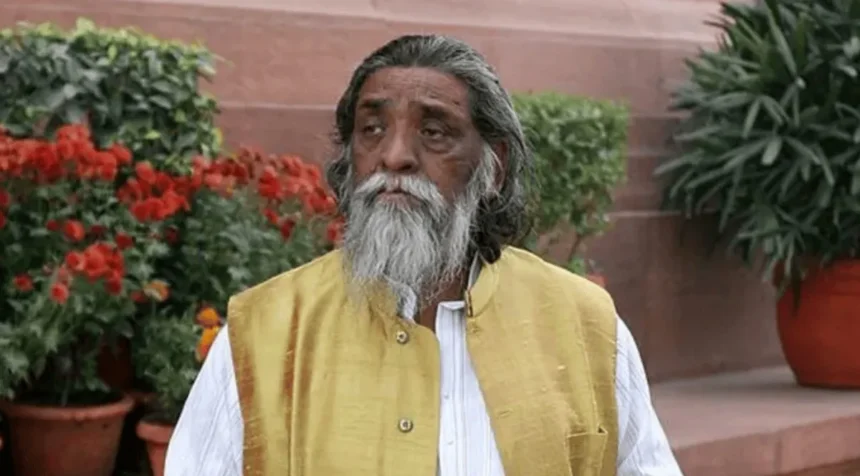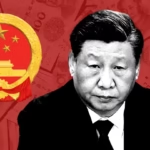NEW DELHI– Shibu Soren, founder of the Jharkhand Mukti Morcha (JMM) and a towering figure in Indian politics, died on Monday, 4 August 2025, aged 81. The well-known tribal leader, affectionately called Dishom Guru (Great Leader) by his followers, lost his battle with chronic kidney disease and stroke complications at Sir Ganga Ram Hospital in Delhi. He had spent over a month on life support. The legacy of Shibu Soren continues to inspire many.
His death marks the end of a significant chapter in Jharkhand’s politics and leaves behind a legacy dedicated to tribal rights and social justice.
Shibu Soren’s contributions to tribal rights and social justice are unparalleled.
Born 11 January 1944 in Nemra village, Ramgarh district (then Bihar, now Jharkhand), Shibu Soren belonged to the Santhal tribal community. Tragedy struck early when his father was killed by men sent by moneylenders. This event deeply shaped Shibu Soren’s resolve to stand against exploitation. At 18, he formed the Santhal Navyuvak Sangh, encouraging tribal youth to resist injustice.
In 1972, Soren joined forces with Marxist leader A.K. Roy and Binod Bihari Mahato to establish the Jharkhand Mukti Morcha (JMM), a party focused on regaining tribal lands and fighting for a separate Jharkhand state.
As JMM’s general secretary, Soren led movements to reclaim land, sometimes using direct action like entering disputed fields for harvests. His bold tactics and passionate speeches earned him the name Dishom Guru, showing his dedication to tribal upliftment.
A Political Career with Many Highs and Lows
Soren’s journey in politics spanned more than forty years, marked by both success and difficulty. After first winning the Dumka seat in the Lok Sabha in 1980, he went on to win it seven more times, turning Dumka into a stronghold for JMM. He also held a seat in the Rajya Sabha, serving a second term at the time of his death. Soren played a key role in the creation of Jharkhand as a separate state in 2000, often highlighted as his greatest achievement.
He served as Jharkhand’s Chief Minister three times: a brief term of ten days in 2005 (2–12 March), from 2008 to 2009, and once more from 2009 to 2010. Political turmoil, however, meant he never completed a full term. As Union Minister for Coal with the UPA government in 2004, 2004–2005, and 2006, Soren brought the concerns of tribal people to central policies, though his time as minister was frequently cut short by legal troubles.
Soren’s career was also marked by controversy. In 2006, he was convicted over the 1994 murder of his private secretary, Shashinath Jha, making him the first Union Minister found guilty of murder in India. The case, tied to alleged bribery related to a parliamentary vote in 1993, led to his resignation and a life sentence. The Delhi High Court cleared him in 2007 due to a lack of proof. Other cases, including accusations from the 1975 Chirudih violence, were later dismissed, letting Soren rebuild his reputation.
Work and Recognition
Soren’s work for the formation of Jharkhand and the welfare of tribal communities stands unmatched. Statehood, achieved in 2000, came after years of agitation led by him, which united tribal people and gave them a political voice.
As a reformer, he fought against moneylenders and pushed for alcohol bans, building strong support among the marginalized. He turned JMM into a dominant force in Jharkhand, and the party remains influential under the leadership of his son, Hemant Soren, the current Chief Minister.
Soren’s hands-on style and deep commitment won him praise from all sides. President Droupadi Murmu called him a “champion of tribal identity,” saying his loss is a “big loss for social justice.” Prime Minister Narendra Modi described him as a “grassroots leader” who fought for the underprivileged, and personally visited the hospital to pay respects.
Congress leader Rahul Gandhi highlighted Soren’s tireless campaigns for tribal rights, and Arvind Kejriwal from the Aam Aadmi Party described Soren’s death as a huge setback for the country’s politics and tribal causes.
Political colleagues like Jharkhand BJP chief Babulal Marandi and Raghubar Das remembered Soren’s humble nature and guidance, with Das saying, “Guruji was like a father to me.” Leaders from Tamil Nadu and Kerala, M.K. Stalin and Pinarayi Vijayan, also sent tributes, recognizing Soren’s role in giving political strength to Adivasi movements.
Family Loss and Jharkhand’s Grief
Hemant Soren, his son and current Chief Minister, shared news of his father’s passing on X, writing, “Respected Dishom Guruji has left us all. Today, I have become ‘shunya’ (zero).” This message captured the sense of loss felt across Jharkhand. The state declared three days of mourning from 4 to 6 August 2025. The Jharkhand Assembly ended its session early as members raised slogans of “Shibu Soren Amar Rahe” (Long live Shibu Soren).
On 4 August, Soren’s body was brought to Ranchi, drawing large crowds to his Morabadi home. The next day, his body was placed in the Jharkhand Assembly for public tribute, then taken to Nemra for his last rites. He is survived by his wife Roopi Kisku, sons Hemant and Basant, and daughter Anjali. His eldest son, Durga, died in 2009. Hemant and Basant, who lead JMM’s youth wing, continue their father’s work.
Shibu Soren’s Legacy
Shibu Soren’s life showed lasting determination, shaped by a deep sense of duty to tribal rights and social equality. Rising from a young activist challenging old systems to a leader shaping Jharkhand’s future, he channelled the hopes of countless people. Despite legal and political battles, his efforts for the tribal cause and state creation will not be forgotten.
With his passing, Jharkhand mourns a leader but also remembers a vision that still shapes its politics today. Leaders like Jairam Ramesh reflected this feeling, describing Soren as a true legend who inspired others with his quest for social and economic justice. For many, Shibu Soren was more than a political figure: he became a symbol of hope, struggle, and achievement for the people of Jharkhand.














